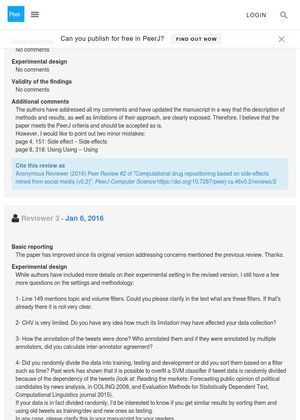Peer Review of Computational Drug Repositioning Based on Side-Effects Mined from Social Media
February 2016

TLDR The peer review highlighted the need for clearer data handling, questioned the study's validity, and recognized improvements from the original version.
Seven years ago, a peer review was conducted on a study that proposed a computational method for drug repositioning using side-effects data mined from social media. The reviewers raised several concerns, including the need for clarification on how the data was divided into training and testing sets, the limitations of the Consumer Health Vocabulary (CHV) used, and the need for more details on the annotation of tweets. They also questioned the validity of the study's findings, noting that the influence of data provenance on the results was not evaluated and that common side-effects shared by drugs in the study are commonly associated with many drugs. The reviewers also criticized the study's limitations and the ambiguity of the evaluations in the paper. Despite these concerns, they acknowledged that the paper had improved significantly from its original version.